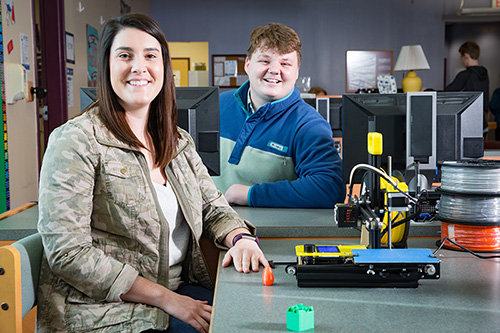Two University of Arkansas graduate students received a grant from the Fayetteville Public School Foundation to fund a coding and computer science project they started at their teaching internship site last semester.
Ryan Dillard and Danielle Phillips are both pursuing a Master of Arts in Teaching degree with a concentration in STEM education. Stem stands for science, technology, engineering and mathematics. The degree is offered by the College of Education and Health Professions.
The students were assigned teaching internships in first-grade classes at Washington Elementary School in Fayetteville in the fall. Dillard's mentor was Terra Ogle, a graduate of the U of A M.A.T. program. Phillips' mentor was Kelly Wade, also an M.A.T. alumna. They will return to Washington Elementary for another internship placement later in the spring semester.
The grant allowed Dillard and Phillips to purchase a product called "MaKey-MaKey" that allows students to manipulate a computer in ways they never imagined.
"We plan to implement this at first in the older grades but eventually working to lower grades and teaching them how to use the hardware," Dillard said.
Phillips said STEM education provides students with many valuable skills that can be applied in and out of the classroom.
"Students that are given the opportunity to not only be problem-solvers but also part of a team, are able to attain skills that can be applied to any content area or any real world issue that a student may be presented with," she said. "Students gain confidence in being risk-takers and acquire the ability to be effective communicators when they are faced with a problem or conflict. We cannot wait to see the excitement and impact this program will have on the students at Washington Elementary!"
Dillard said he is interested in STEM education because of the cross-curricular benefits he has seen in the classroom.
"It not only teaches students about science, technology, engineering, and mathematics, but it teaches students how to work as a team to produce one product," Dillard said. "It also teaches students how to problem solve, how to speak in front of people, and how to think logically about a problem. I have seen firsthand how teaching STEM benefits other content areas in the classroom."
Dillard and Phillips' project, called "Coding: It's Elementary," has the potential to impact 250 students in kindergarten through fourth grade at Washington Elementary.
"Coding has numerous benefits in a twenty-first century classroom," the students wrote in the description submitted with the funding request. "According to research, students that are given the opportunity to explore and manipulate computer systems are more likely to check work for details, problem solve, and show endurance while performing difficult task (Heese, 2014). The Makey-Makey hardware will provide a hands programming experience for students. Students will see first-hand how they can manipulate computers and use them to create computer programs.
"All students will be asked to create computer programs that are age appropriate and that correspond to regular classroom curriculum," the description continued. "The Makey-Makey hardware can enhance all subject areas, such as music, science, geography, social studies, and English language arts."
The students of Washington Elementary will rotate through the STEM lab once a week throughout the school year.
Topics
Contacts
Heidi S. Wells, director of communications
College of Education and Health Professions
479-575-3138,
